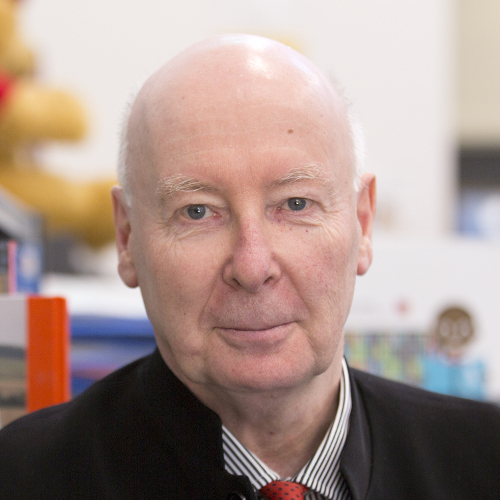Pie Corbett’s 10 secrets of reading schools

Learn from the teachers who are getting it right in their classrooms…

- by Pie Corbett
- Inspirational trainer, poet, author and editor of over 250 books Visit website

Why is it that in 2016, when only 47% of children reached the expected level in the reading SATs, some schools in deprived areas had high standards?
Talk for Writing visited these schools to find out what made the difference.
1 | Reading for pleasure
This is developed through a daily read-aloud programme of great books and page-turners, as well as access to a wide range of titles, including comedy, comics and graphic novels.
Time is devoted to daily quiet reading, even if this is only 15 minutes at the start of the day. Reading for Pleasure is not a poster or slogan; it is when children read greedily with passion. Books spread like wildfire, from Peter Bunzl’s Cogheart to Kiran Millwood Hargrave’s The Girl of Ink and Stars.
2 | Reading teachers
Teachers at these schools believe in the importance of reading, and many are avid readers themselves. They hold book clubs, work with authors, share quality texts among themselves and on Twitter.
They know children’s books well, have a good understanding of how to teach reading and are skilled teachers. Through their enthusiasm for reading, they become the significant reader in the children’s lives.
3 | Reading schools
In the schools visited, the leadership team drive the reading programme. They know what is happening and impact is carefully checked. Teaching is constantly updated and refined in the light of research and experience.
They use SATs data to focus teaching but are just as keen to monitor children’s motivation. The school’s programme is non-negotiable, vigorously lead and supported by constant ongoing training. This is followed up with in-class support as well as monitoring. Reading is central to the culture of school.
4 | Phonics matters massively
Phonics is a high priority. Despite being in areas of deprivation, children decode and spell using phonics automatically. This early teaching is daily and vigorous. In one school we inspected, lessons had children ‘spellbound’, ‘filled with giggling, gleeful responses’.
There are three keys aspects: phonics is applied to reading, it works from sound to print for spelling, and teachers check there is no gap between spelling and decoding.
Teaching is not overburdened by workbooks; there is rapid intervention for anyone falling behind. This is accompanied by daily comprehension, using great picture books and ‘Big Books’.
5 | Teach vocabulary
Vocabulary is taught daily in English lessons and other subjects. Generally, children do not struggle with reading comprehension if decoding and vocabulary are well developed.
It is taught through developing an interest in and love of words. Where do words come from; how do they work; how are they spelled; how are they used? Much of this work is based on Isabel Beck’s book Bringing Words to Life:
- Provide a child-friendly definition
- Children repeat the word and definition aloud
- Plan activities to deepen understanding
- Use in sentences
- Put key words on display and in magpie books for future use
Key vocabulary activities include:
- Using context when reading to work out possible meaning
- Modelling use of vocabulary in shared writing
- Using props, images and film clips
- Miming verbs and adverbs
- Discussing related words, roots, suffixes and prefixes
- Relating words to own experiences
- Synonyms and antonyms
- Adults modelling high level vocabulary
- Daily speed words – rapid reading, spelling and usage
6 | Use quality texts
In one school, we filmed a Y6 teacher working with a discussion text comparing Carlyle’s view on heroism with Nietzsche. This helped children discuss heroism in their core story, Beowulf.
Most of the schools had an agreed ‘reading spine’ that identifies the quality core books that will be studied. Download my free guides at scholastic.co.uk/piecorbett/resources.
7 | Test familiarity
A common feature of successful schools is that the staff all ‘sit’ the SATs papers and mark their answers using the mark scheme. None of the schools endlessly tested children.
Question types are sneaked into the daily business of enjoying and interpreting books, with formal test preparation during the final weeks.
8 | Daily direct teaching
Shared reading is used to teach the whole class; guided reading to teach different groups, and time is given to independent practice. In one school, guided reading is staggered across the school so a group of trained adults arrives in each class to assist.
Teachers model being a reader by saying things such as, ‘The author is suggesting that…. I know this because the author states…’. They read line by line, slowing the text down so that children get into the habit of making links between sentences.
Oral comprehension explores open and focused questions, deepening understanding and appreciation. Pupils are not ‘guessing what is in the teacher’s head’. Children are invited to share their ideas: ‘what can we say about this?’.
Children are used to building on an idea or challenging a thought. Lessons look more like a serious conversation in an adult book club. Good questions take us back into a text, to think deeply.
Weak questions lead away from the text or have obvious answers. In many KS2 classes, pupils make notes, discussions are recorded by the TA on the flipchart and used as a basis for shared and independent writing.
Comprehension is developed through discussion but also supported by drama, map making, writing in-role and the arts. Broader reading enriches understanding and reading may be linked to relevant experiences, such as visiting a manor house when reading Tom’s Midnight Garden.
This deepens understanding, helping children inhabit the text. However, it is worth remembering that the main stumbling blocks to comprehension come from either problems with decoding, poor vocabulary or lack of world knowledge
9 | Read daily in other subjects
Reading is also taught daily in other subjects; a paragraph about the current learning containing core vocabulary and subject specific sentence patterns is read and discussed, eg My hypothesis is….? This extra reading provides more teaching time and increases subject learning. Words hold knowledge.
10 | Involve parents
The schools we visited put effort into motivating parents, but because their systems are strong, many children whose families might not be able to support still become readers. Indeed, what is remarkable about each school is that the teachers are determined to get everyone reading, opening the gateway to a life of learning and pleasure, believing everyone can achieve.
How to talk about books
- All ideas are accepted
- Everyone should ‘have a go’
- Be ready to change your mind
- Listen to each other
- It helps to be tentative, eg ‘We wondered whether…’
Further reading
- Which Book and Why: Using Book Bands and Book Levels for Guided Reading in Key Stage 1 by Sue Bodman and Glen Franklin (Institute of Education Press)
- Guiding Readers – Layers of Meaning: a Handbook for Teaching Reading Comprehension to 7-11-Year-Olds (UCL IOE Press)
- Tell Me: Children, Reading, and Talk by Aidan Chambers (Stenhouse Publishers)
Click here to download more great free Pie Corbett stories, poems and resources.
Pie Corbett is an English educational trainer, writer, author and poet who has written over 200 books. He is also known for promoting creative approaches in the classroom and has experience as a teacher, headteacher and Ofsted inspector. Follow him on Twitter at @PieCorbett.










